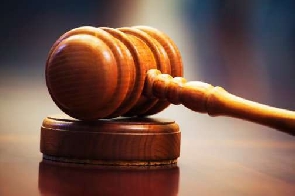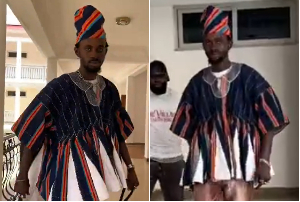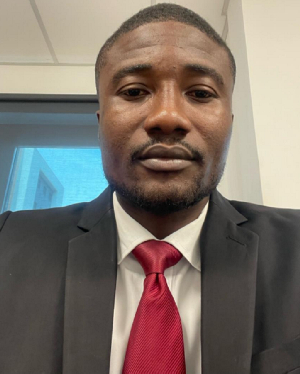There is an inclination to believe that some Ghanaian court judges are a complete blemish on the justice system of the country.
Not only are they unfair in their delivery of justice, they appear to have difficulty understanding and interpreting the laws and the constitutional articles as are written in the statute books.
These court justices in my mind, do clearly come across as unprofessional, either by intention or inadvertence. Are they induced by bribe, cowed by certain powerful persons in the society into deciding cases clearly contrary to the laws? Is it rather by their very nature of lacking comprehension, interpretation and application of the laws as are relevant to the cases brought before them that compels them to behave so?
In order not to beat about the bush but to hit the nail right in the head of the drum but not on its side, let me be very specific here.
There was a chieftaincy dispute case brought before a High Court judge in Kumasi. This time, I am going to withhold his name but I had in two of my previous publications mentioned his name. The case hinged on clearly established corrupt practices and malpractices anathema to agreed conventions, untouchably established and prevalent traditional procedures and best practices and by large an infraction.
The committed crimes were indisputably captured on a recorded video. By my investigations and very knowledgeable opinion sought, the video constitutes a credible, permissible and acceptable evidence in the Ghana courts of law. Nonetheless, it was rejected by the said judge.
The rejection of the evidence per se is not the issue that bothers me much but the words or a statement from his mouth prior to throwing away the case and his difficulty to understand the seriousness of the case in terms of the law breached. He had not only licked back his own sputum but proven himself unfit to be a judge able and capable of deciding cases brought before him fairly, without fear or favour.
He had earlier promised to play the evidential video in court. On the appointed adjourned date, when the video was due to be played, it rather became the fateful day of dismissing the case. In his brief two or three minute statement made, after taking his seat, the judge said in a squeezed face and irritated voice, “I am not going to play the video. ….. (name withheld) says he has installed his chief already. So… (name of town withheld and the queen withheld) go and enstool your candidate as the paramount chief”
How and why should an alleged most powerful and feared traditional overlord in Ghana, a country which is not a total monarchy but a republic, be allowed not only to interfere in court proceedings but dictate to a judge employed by the government and paid with the taxpayers’ money to disregard the applications of the law as are relevant to a case?
Is such a judge taking instructions from whomever, in contravention to the laws, rules of court, case laws, court procedures and best practices, fit to be a judge to decide cases in Ghana? To the best of my knowledge and experience as acquired in the civilized Western world, the answer is a big No!
The said case had to do with the illegal attempt to install, and installation of, a candidate as chief-elect, contrary to the laws of the land and Section 13 of the established applicable Warrington Notes as well as the traditional norms of the locality concerned, as are established and judiciously adhered to in their application since the foundations of the locality.
The chieftaincy dispute as constitutes “cause or matter of chieftaincy dispute” that any lower court up to the Appeal Court of the land cannot adjudicate on but the Judicial Committees of the National and Regional Houses of Chiefs and the Supreme Court, is clearly stated in Chieftaincy Act 759 and the rules of court of the High Court.
In case a chieftaincy dispute involving a murder is caused and the culprit caught, will he be arraigned before any of the lower courts as stated above or the Judicial committees of the National and Regional Houses of Chiefs and the Supreme Court? Although the murder has come about as a result of chieftaincy dispute, it does not fall under the “cause or matter of chieftaincy dispute” as is clearly stated in plain English understandable to any Junior Secondary School student in Ghana.
Therefore, for a learned judge to fail to interpret the law in relevancy to the case brought before him but to timidly allow himself to be dictated to, makes him a misfit in his position as a judge, should I be honest with Ghanaians.
Again, why should a judge continually keep deferring a genuinely established “will” case brought to his court since year 2008 without any hint of ever pronouncing a judgment? The case keeps being adjourned to weekly, fortnightly and monthly dates depending on the whims and caprices of the judge, probably acting in connivance with both the plaintiff’s and defendant’s lawyers.
What makes the attitude of the judge so weird is, the defendant’s lawyer who is preventing the execution of the “will” against the decedent’s wish in favour of his children, does not appear in court. Therefore, what is going on?
The current Kumasi High Court judge knows how long the case has been pending in court and even raises a concern about it. What then prevents him from declaring his verdict however he sees it fit, to bring a closure to the case, or to allow an appeal to the appellate court to take place?
Finally, is it right for a lawyer who has charged his client a heavy sum of money to represent the client in court in an ongoing case, without prior agreement to any hidden charges, to turn around to demand further money from the client?
A lawyer in Kumasi has just been engaged and paid three-fifths of his charge upfront. He has also been paid a demanded fee of Ghs500 to prepare and file certain documents.
Hardly had he been to court when he told his client that each day he goes to court, he will collect Ghs200 from the client for his transportation fee (T & T), although from his office to the court is within a walking distance of five to eight minutes maximum. He says, should the client ever fail to do as demanded, he will not go to court and the client had better find another lawyer.
When he was questioned by the client why he had not disclosed any such hidden charges when his services were being sought, he retorted, “had the lawyer who recommended me to you not told you about it?” Sorry, this to me is bullshit!
This attitude by the lawyer cannot be accepted in any civilized world or go without punishment should it occur and be reported. Why didn’t he himself tell the client when he was charging for his services in which he has received a handsome part-payment?
When he was begged or challenged, he reduced his demanded periodic transportation fare from GHs200 to Ghs150. However, not without first saying, the client is a group of siblings that can be informed to chip in individually towards paying his transportation fee, and also, he is helping them to acquire a property.
Does this make any sense? So should the case be postponed to weekly basis and linger in court for years, the client must pay the lawyer Ghs150 every week or else, he will cease being the client’s counsel at any point that the payment is not made? Again, should he unduly indirectly avail himself of the benefits of the property by charging the client that amount of transportation fee?
These distasteful attitudes and wrongdoings by some judges and lawyers must cease or else, be escalated to the attention of the leaders of the Ghana legal system, thus, the General Legal Council.
Opinions of Saturday, 20 March 2021
Columnist: Rockson Adofo















